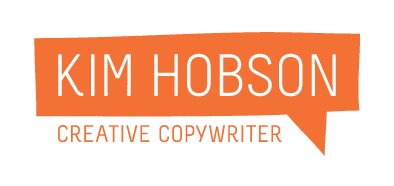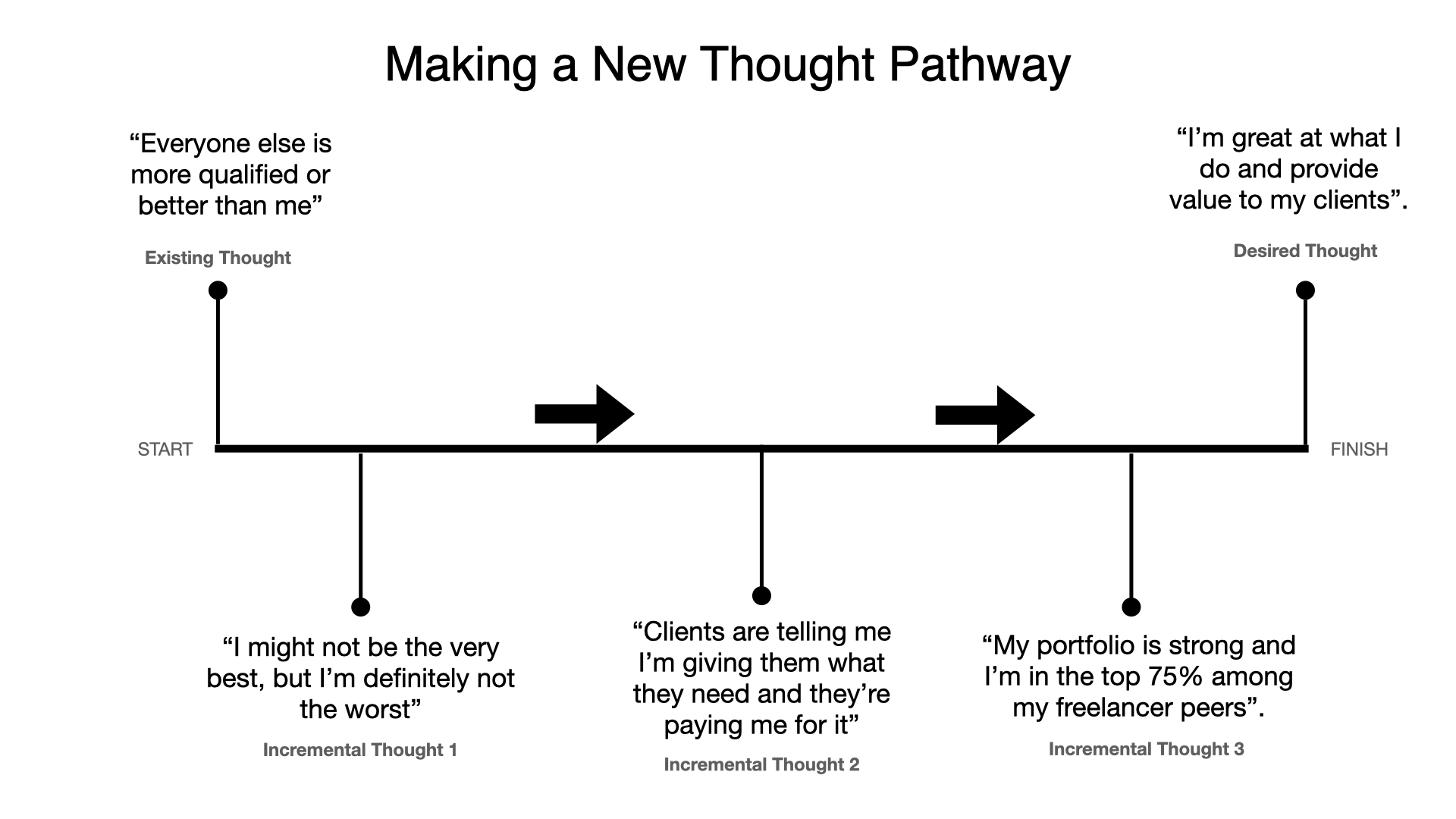It’s that time again!
You’ve had a great few months freelancing and delivered some top work on projects, but now things have slowed down a little.
So you’re feeling kinda lousy. You’re getting anxious and having low self-esteem about whether you’re even good at what you do.
You take on clients and despite their positive feedback, you’re not sure you can meet their expectations. You’ve done things similar to this project before but that was a fluke. You’re out of your depth and everyone is going to find out you’re a fraud that’s been faking it all along.
Or worse, you see that a new freelancer has entered your market!
They are offering something very similar to what you do. They must be better than you! So you shy away and stop marketing yourself.
It’s hopeless. All of your clients are going to leave you for this new freelancer who must be so much more talented and qualified than you.
You didn’t belong here in the first place, what were you thinking?!
Say Hello to Freelancer Imposter Syndrome
If you’re a freelancer, I’m almost certain you’ve experienced elements of this thinking before (or, if you’re like me, all of it). That despite all you’ve accomplished, how educated or experienced you are, you feel inadequate and amateurish.
Imposter syndrome sucks and it’s stopping you levelling up and reaching your full freelancing potential. So let’s take a look at why imposter syndrome happens for freelancers and how we can deal with it.
Why Freelancers Are Particularly Susceptible to Imposter Syndrome
First of all, take some solace in the fact that it’s not just you. It’s estimated that 70% of people have imposter syndrome and the feeling they don’t deserve to be where they are at some point in their career (I assume the other 30% are narcissists, sociopaths, deluded or they are lying to us).
Take additional solace in the fact that imposter syndrome shows up particularly hard for freelancers due to the nature of the work:
Most of the time you work alone
Freelancers work in a non-traditional setting. There’s no manager to pat you on the back and give you praise. You might not hear much feedback from clients and be left to overthink the work you’re doing and delivering.
It’s extremely hard to have a truly objective view of your work
Negativity bias means you’re much more likely to exaggerate and remember the things you didn’t do perfectly over the things that were positive. If you do receive praise, imposter syndrome makes you discount or play down the ways you contributed to a project’s success.
You’re constantly kicking-off projects
The nature of freelancing means you’re constantly starting new projects, each with a new set of requirements, problems to solve and challenges to overcome. And you’re often an outsider working with an established team. Imposter syndrome can lead us to feel like frauds, we attribute past success as a fluke and doubt we can repeat the success or deliver on a project again.Your career is based on rejection and relationships
Freelance work can be inconsistent and when you're constantly pitching and prospecting, you’re going to get a lot of “nos” and negative responses and those can sting. This can lead to you developing an external attribution style - you think you’re getting jobs because of luck, timing and connections rather than skill or work, which increases the feeling of being an imposter.
What are the Root Causes Imposter Syndrome for Freelancers?
Where do these negative thoughts of inadequacy and low self-esteem that lead to imposter syndrome come from?
Negative Self Talk
We tend to be a lot more self-critical than we would be towards other people. You’re probably in the habit of believing those critical and often nasty things you say to yourself. “I’m not good enough” “I don’t belong here” “I’m not even a “real” writer/ designer/ developer and everyone is going to find out”.
Parenting
If your parents or caregivers were overly critical of you, or set pretty high expectations, they likely set you up for having imposter syndrome (even though they probably meant well).
We internalise our primary caregiver’s voice so if they were overly critical, likely you are to yourself too. And if your parents taught you that your value was your accomplishments or overly praised your intelligence, you might be terrified of finding you’re not as smart as people think you are/ you think you are.
You Actually Care
Part of imposter syndrome for freelancers comes from respect for the work and client. You want to deliver something of value. You want the client to succeed, so you think you might not be the best person for the job.
Why is Imposter Syndrome Detrimental for Freelancers?
Imposter syndrome interferes with you going after what you want, not just in work, but in life too.
You owe it to yourself to challenge that nay-saying, bad vibes voice, because that voice will make you turn away from challenges, risks, change, and, not to mention, money.
Imposter syndrome isn’t based on reality. It’s just your mind feeding off negative thoughts and self-doubt.
Not challenging that imposter syndrome voice is the saddest thing. Because it means you won’t achieve what you are very capable of achieving. If you don’t take steps to remedy that imposter syndrome, here’s how it’s going to keep showing up in daily freelancing life:
You feel insecure about your skills so you don’t promote that blog post about your new service or product. That could have got you new client queries, more leads and more work.
You don’t pitch for that exciting project because you think you’re not enough of an expert yet. Afterall, there’s so much you don’t know!
You don’t raise your rates because you don’t think you’re a “real” designer/ writer/ developer, so you’re not worth that price. You don’t click send on that proposal, instead you redraft it and lower the rate to one that makes you feel comfortable, costing you time and money.
You get walked over because you feel insecure so you don’t tell the client their requests are out of scope. You don’t push back on their requested changes because you got that job because of “luck”. To please the client, you end up having to do something that negatively impacts the project which ends up being mediocre (lowering your confidence even more).
You’re holding yourself back, limiting your potential, success and happiness all because you’re listening to a (wrong) voice in your head over all the evidence that is all around you. And that is unacceptable.
What you Need to Consider Regarding Imposter Syndrome as a Freelancer
First of all let’s have a little reality check and remember a few important things:
You live in a bubble
You probably live in a little internet bubble and it does not reflect the real world. Do yourself a favour right away by not comparing yourself to people at the very top of your field or outside it.
You’re very likely to only be seeing their showreel and not all their failures and fuck ups. When you meet real people or hang out in an office for a few days, it’s much easier to see that you are talented at what you do.
You don’t know how much you know
Impostor syndrome arises as a result of becoming more accomplished at what you do.
You forget all the learning you’ve done to get you here. And the more you know, the more you know you don’t know. Even if you’re new to freelancing you probably have a ton of transferable skills at your disposal.
Growth comes at the edge of your comfort zone
The greatest personal growth comes by taking on what you don’t think you are ready to handle. What if you fail? Sure. But what if you succeed? What if this is a career-defining move for you, what if this makes you!? And if you end up in over your head, that’s not necessarily a bad thing. Learn to value things not going 100% the way you envisioned because you appreciate the learning experience it gives you.
Everybody messes up
You’re going to mess up eventually. It’s unlikely to end your business. Even making multiple fuck ups is unlikely to end your career. Most people will understand that you’re human and sometimes mess up. Life goes on.
How to Deal with Imposter Syndrome as a Freelancer
A lot of blog posts on imposter syndrome tell you to do one of these things:
Use Positive Thinking
“Believe in yourself or fake it til you make it”. This is shitty, lazy advice. Positive thinking doesn't just magically work, otherwise imposter syndrome wouldn’t exist. We’d all be thinking happy thoughts and eating rainbows and everything would be great. Just telling yourself you are awesome won’t make you believe it.
Think Logically
“Keep a list of your latest achievements and refer to them when you feel bad”. Think you can rationalise your way out of it? Or use logic to get rid of your thoughts? Pulling out your professional record might seem like a good strategy, but your imposter syndrome brain will just shout back louder at why this has all been a fluke. While it might lift you for a while, telling yourself you’re having irrational thoughts doesn’t mean you’ll just stop having them.
Talk to a Friend
This advice is better. We have a lot more compassion and belief in others than we do for ourselves, so getting outside perspective on what we do, how we’re great and how we succeed can help. But it doesn’t change the thought patterns for the long-term.
A Tool Freelancers Can Use to Deal with Imposter Syndrome
No matter how successful you are, what you achieve, how many prizes you win or how good other people tell you you are, imposter syndrome is unlikely to go away unless you change your thought patterns.
Your Brain and Neural Circuits
Your thinking is a habit. Some thinking is comforting and supportive. Others, like those tied to imposter syndrome, are negative.
Smart scientists tell us that when we repeat something over and over – thoughts or actions – a neural circuit is formed in the brain. It gets stronger every time you think or do the same thing.
So when you’re having thoughts tied to imposter syndrome i.e., “Everyone else is more qualified or better than me”, you can’t just erase it, or tell yourself to stop thinking that way and to think positive thoughts instead. You can’t just erase that neural circuit.
You Need to Make Your Brain form a New Neural Circuit
You are in the habit of negative self-talk. You’re going to change that habit, slowly and incrementally by overriding that negative thought with a new positive one.
To fix your imposter syndrome you need to make a new path from the way you think about your abilities now (negatively), to the thoughts you wish you had about yourself.
New Thinking Habits
Let’s take an example of how we create a Thought Pathway leading to a new neural circuit.
Right now, let’s imagine you’re at ‘Existing Thought’ on the left, and on the right, the ‘Desired Thought’, is where you want to be.
You cannot just go from thinking “Everyone else is more qualified or better than me” to “I’m great at what I do and provide value to clients”. It’s too big of a leap for your brain, it’s not going to believe it. Your brain is not tricked so easily.
So You Need to do it Incrementally
Every time you have that ‘Existing Thought’, you’re going to replace it with a more positive one to eventually follow a path to your ‘Desired Thought’. It’s like taking little steps to get there.
Each thought needs to be incremental, and something your brain can believe because it’s true.
Let’s see what that might look like.
Every time you have your ‘Existing Thought’, you change it to Incremental Thought 1, “I might not be the best, but 100% definitely not the worst”.
First of all this is truthful – you’re probably not the best, because who is ever the very best at their field?! But for sure there are people who are way more terrible at their job than you. This incremental thought is much less fatalist, and is a step in the right direction.
Move Along the Thought Pathway
After you’ve internalised, “I’m not the very best, but I’m definitely not the worst”, it’s time to move along the Thought Pathway to Incremental Thought 2.
“Clients are telling me I’m giving them what they need and they are paying me for it”.
Again, it’s a small step in the right direction and it’s believable, because it’s true.
Once that’s internalised, move forward.
“My portfolio is strong and I’m at least in the top 75% among my freelance peers” (because for sure you will be) and so on and so forth until your ‘Desired Thought’ becomes your default thought.
You’ve Created a New Neural Circuit!
Neuroscience tells us that our brains have the ability to change dramatically throughout our lives, until the day we die.
It takes 3 weeks to form a new habit, when we do it everyday. Your imposter syndrome thoughts might come and go, so bear that in mind when you’re expecting results. They won’t be instant and might take weeks or months of reinforcement.
And you need to be consistent. You need to leverage your incremental thoughts every time you have that negative, self-critical one - counter it with the incremental thought, step by step, until you are where you want to be.
How to Make Your Thought Pathway
Identify your existing negative thought (Existing Thought)
Decide on the thought or attitude habit you want to create (Desired Thought)
Write down Incremental Thoughts that are believable (map out a Thought Pathway)
Practice the incremental thought when you have your existing thought
Continue to move along the Thought Pathway until your Desired Thought is the default thought.
Is this Going to Completely Rid you of Freelancer Imposter Syndrome?
So while I don’t think you can 100% completely get rid of imposter syndrome, you can make it manageable so it doesn’t get in the way of you going after what you want in your freelance career. When you’re freelancing some feelings of self-doubt are somewhat inevitable, and I would also say useful for a few reasons:
It happens when you’re levelling up.
Imposter syndrome will come back when you’re having a shift in identity. For example from a freelancer that works on small, one-off gigs, to someone who takes on bigger project work. That’s good! The imposter syndrome means you’re progressing and challenging yourself.
Ego check
Imposter Syndrome will stop you from becoming arrogant. Self-doubt that stems from being challenged comes from the understanding that there are an infinite number of things that we don’t know. There is so much out there that we have yet to learn! A healthy dose of self-criticism propels us forward to do better - you keep learning and improving. Stay grateful, stay humble.
What’s the worst thing that will happen?
You send a pitch and you don’t win? So? The client doesn’t like what you’ve done. Ok. When you really think about it, what are you afraid of? Fine, things don’t work out this time around. You’re going to learn and that is nothing to be ashamed of. Failure is experience, a new tool in your arsenal that you can use next time to succeed.
So there you have it, the low down on imposter syndrome for freelancers and a handy tool for how to deal with it. Let me know how you’ve gotten on forming those new neural circuits.
About Kim Hobson
Kim is a Freelance Creative Copywriter based in Hong Kong. She helps brands communicate more effectively with words that hook minds and persuade people to take action. She also runs The Freelancer Newsletter, a weekly email helping freelancers to up their careers and grow their businesses.









Being professional is all about doing the job with the least amount of friction. Because we all love quick freelance wins, here are 5 things you can instantly implement to look more professional than 90% of other freelancers.